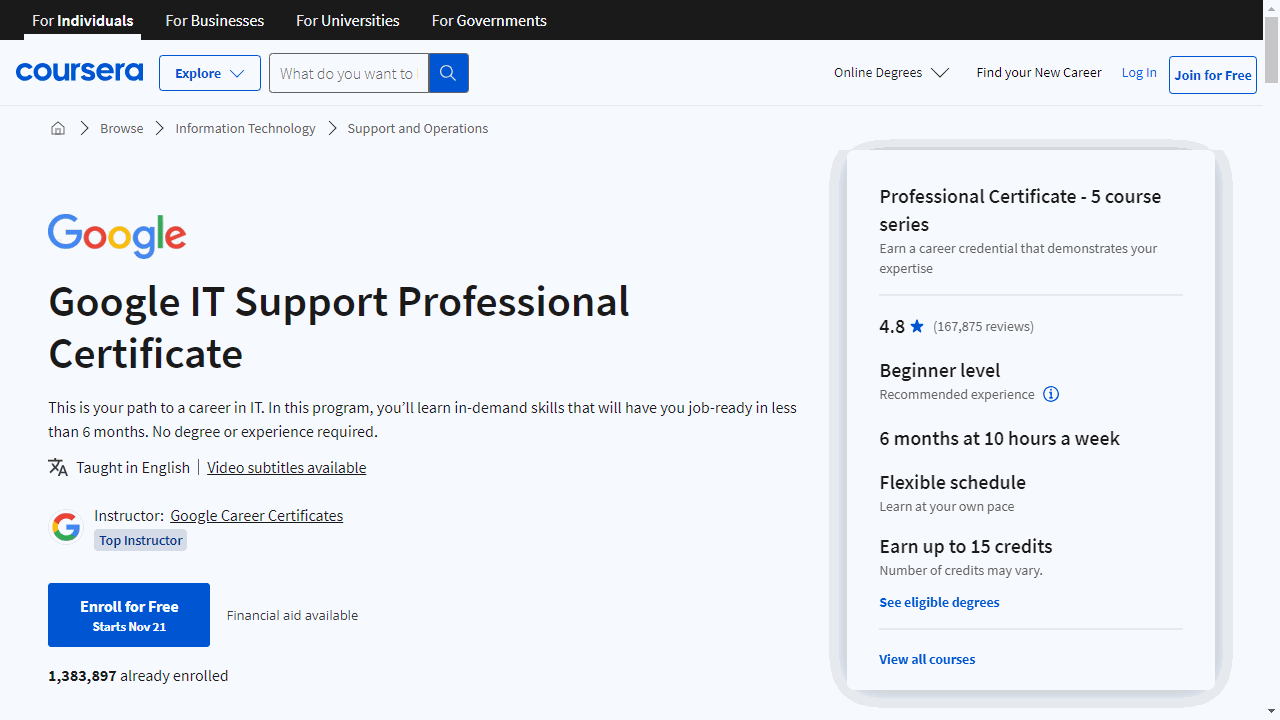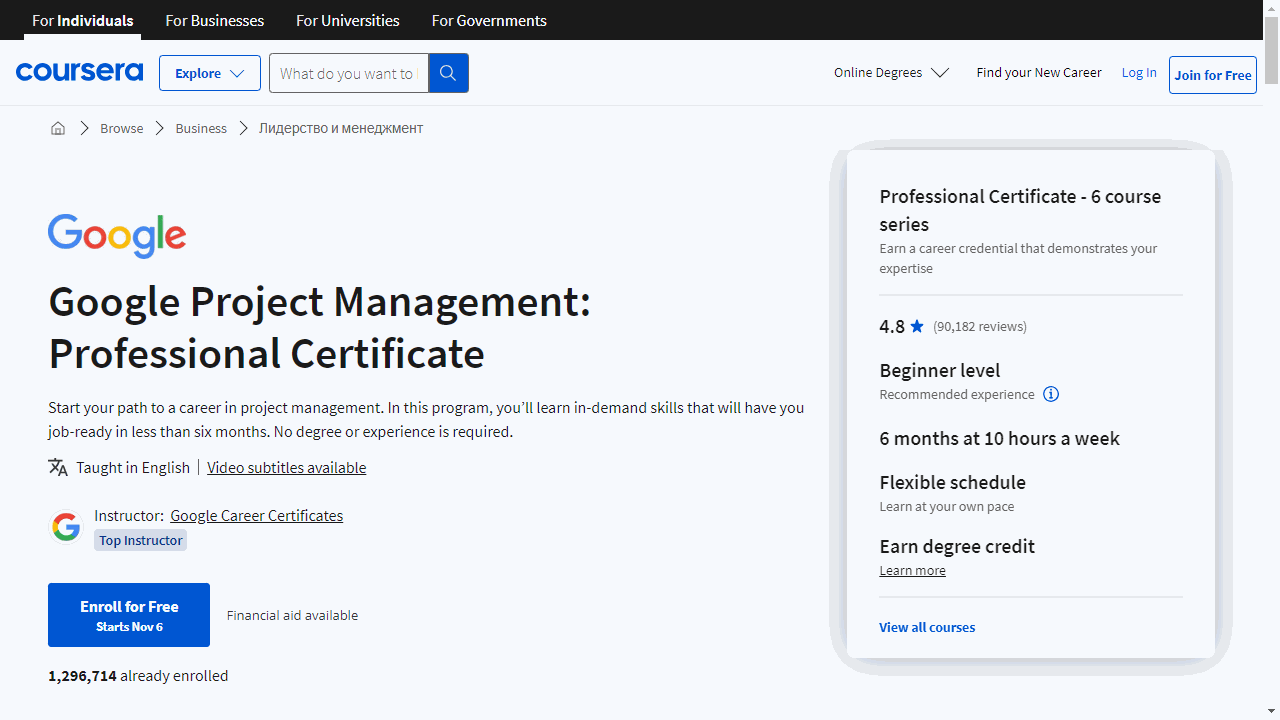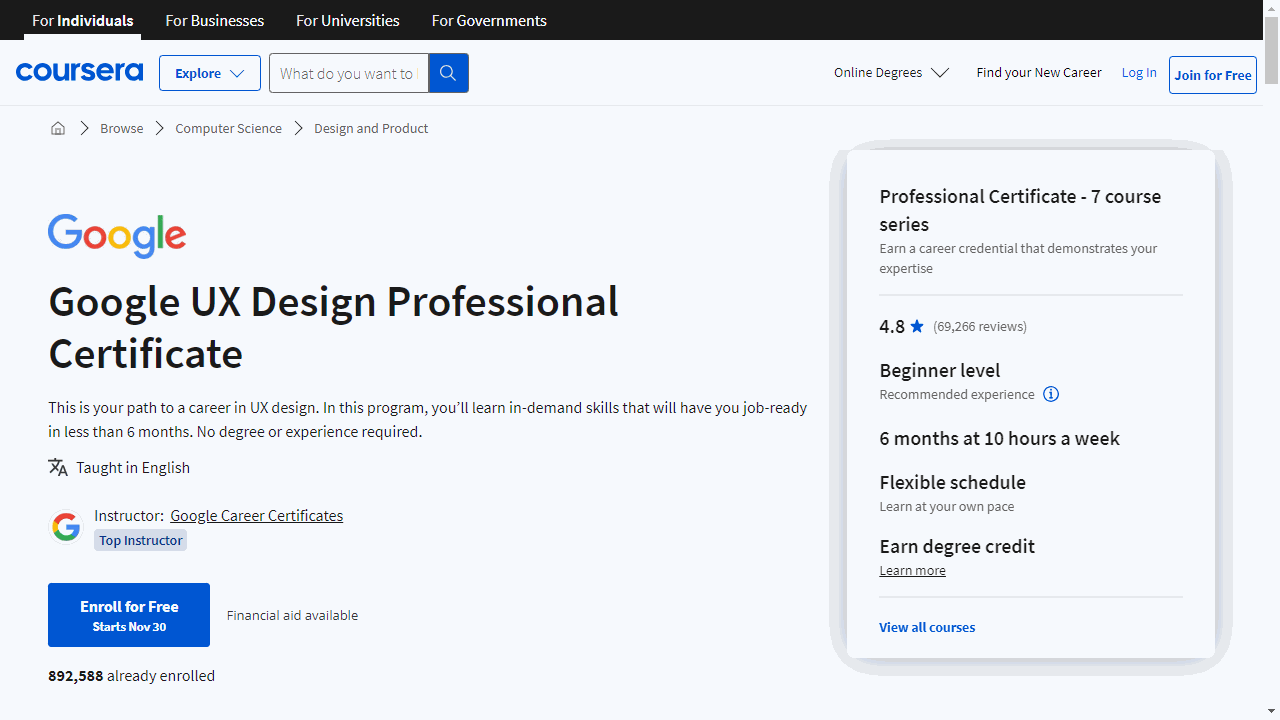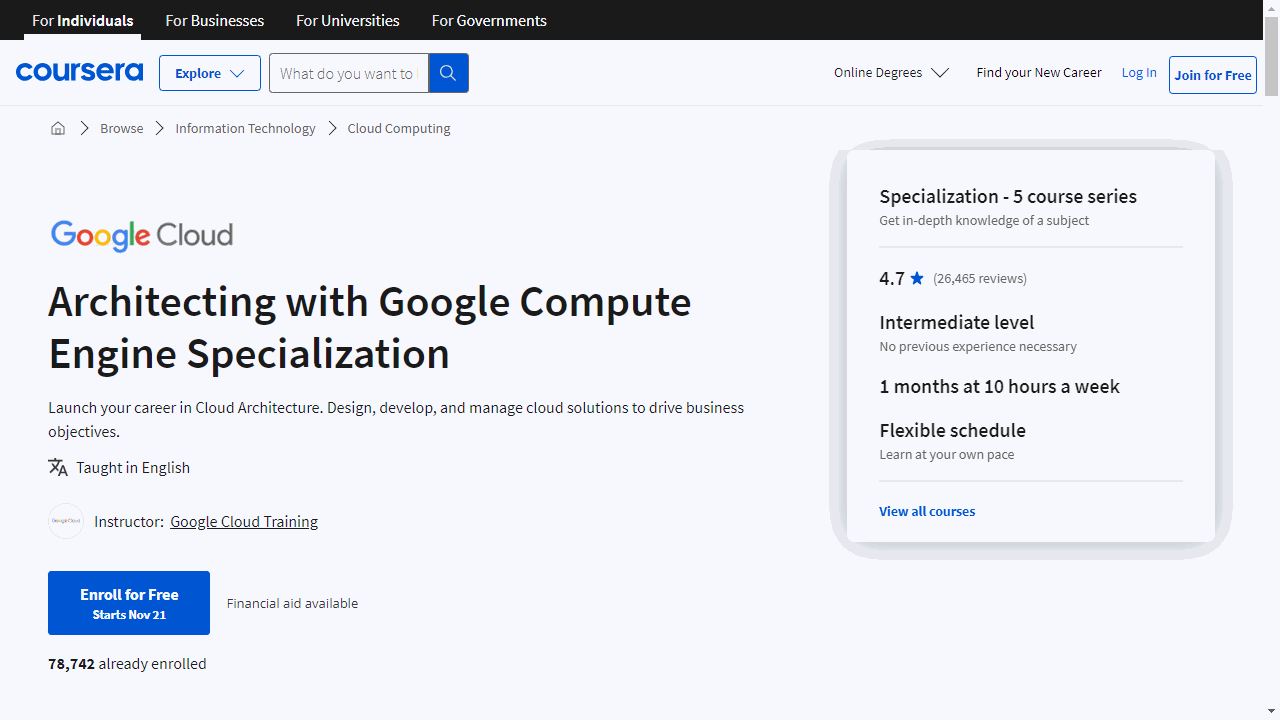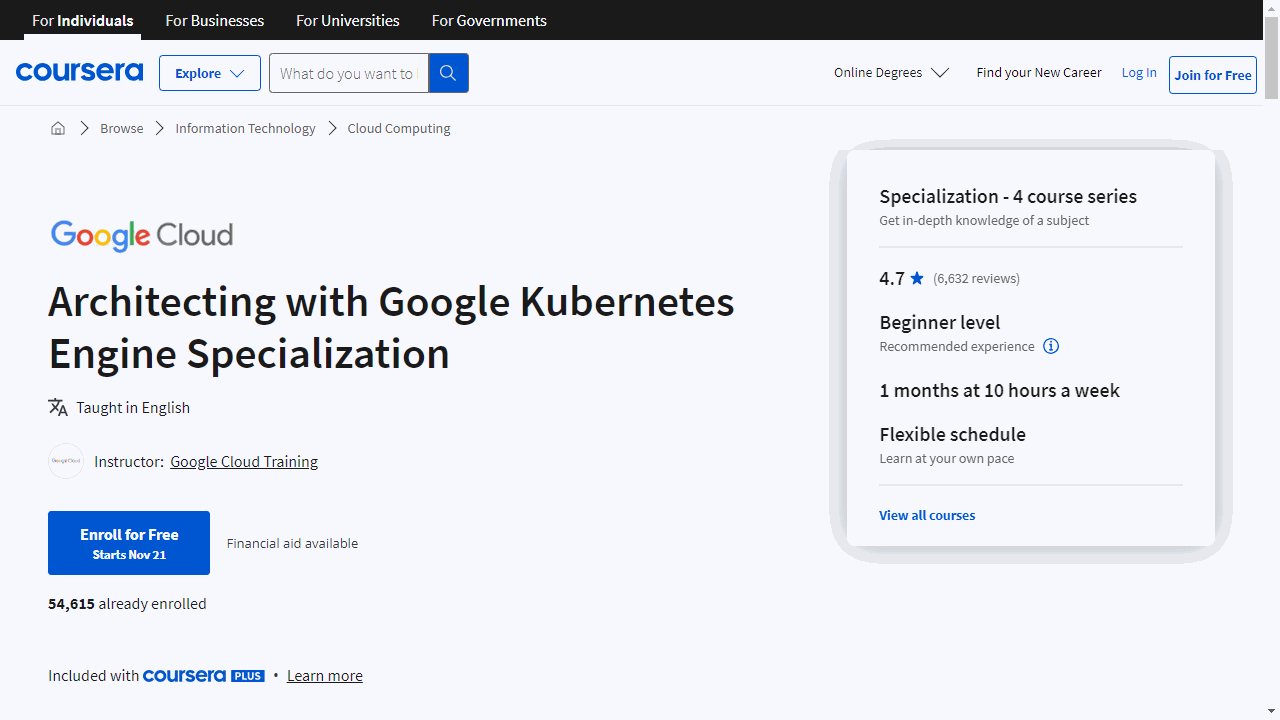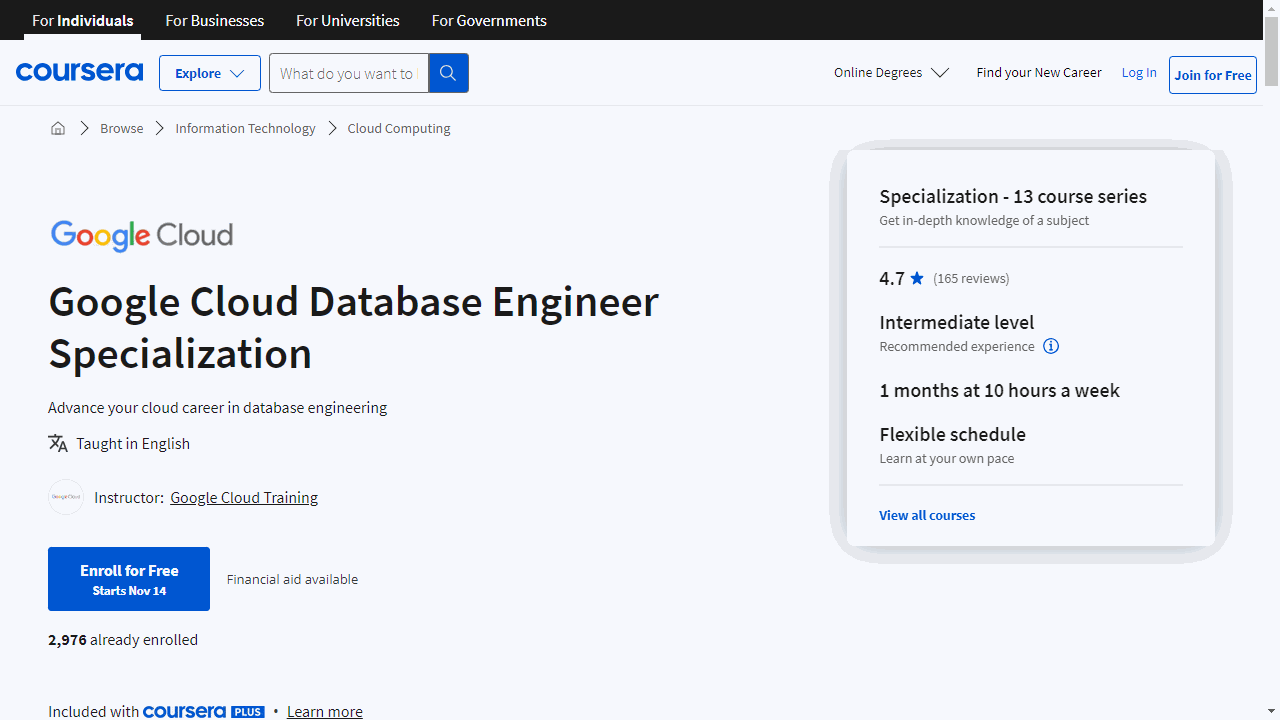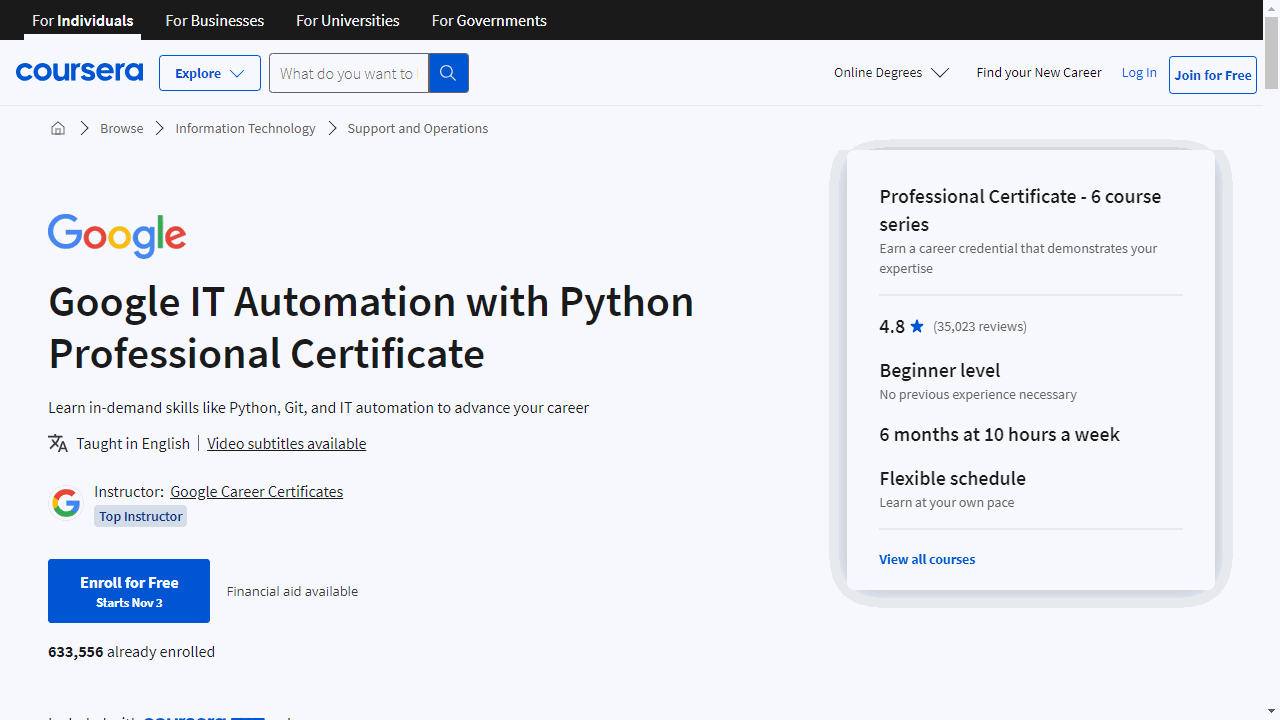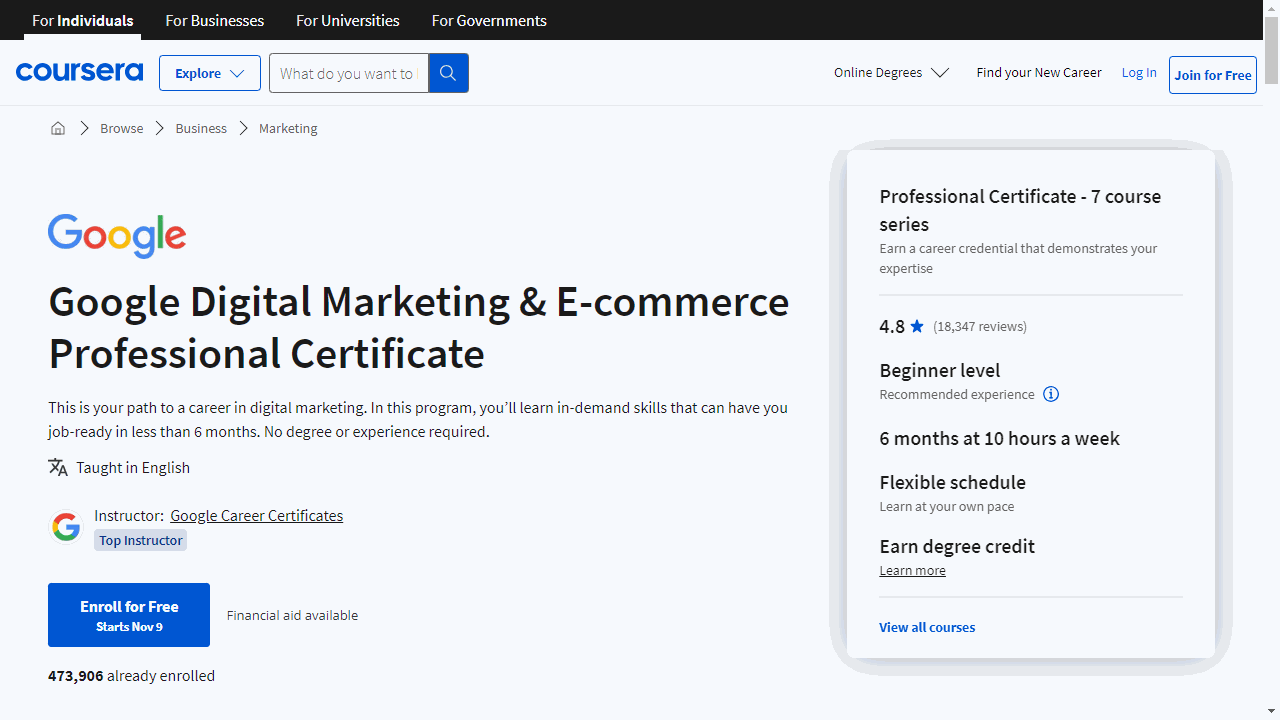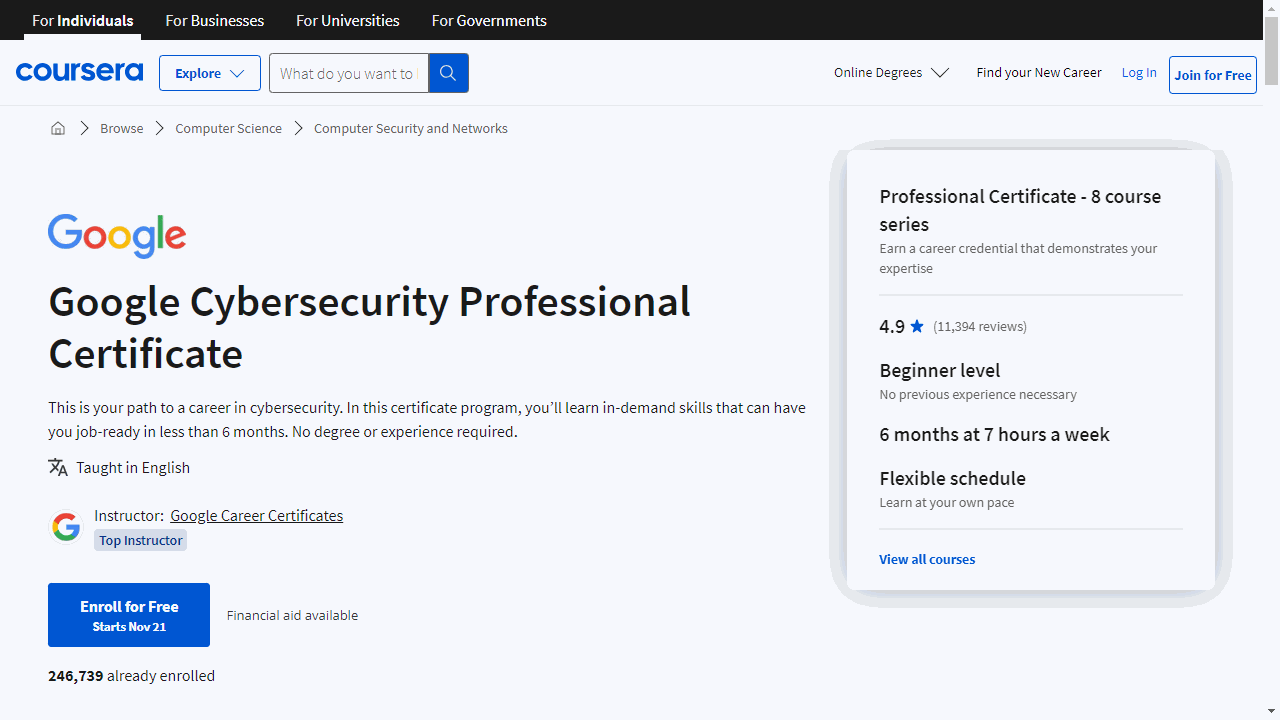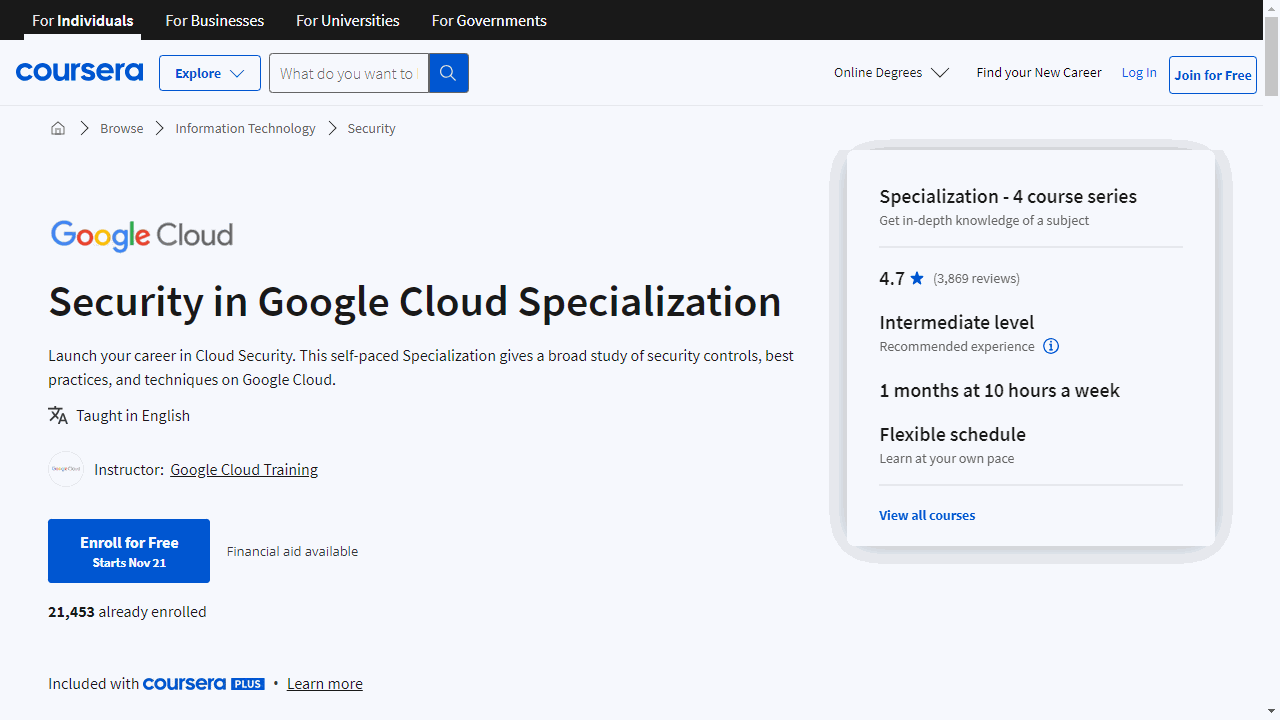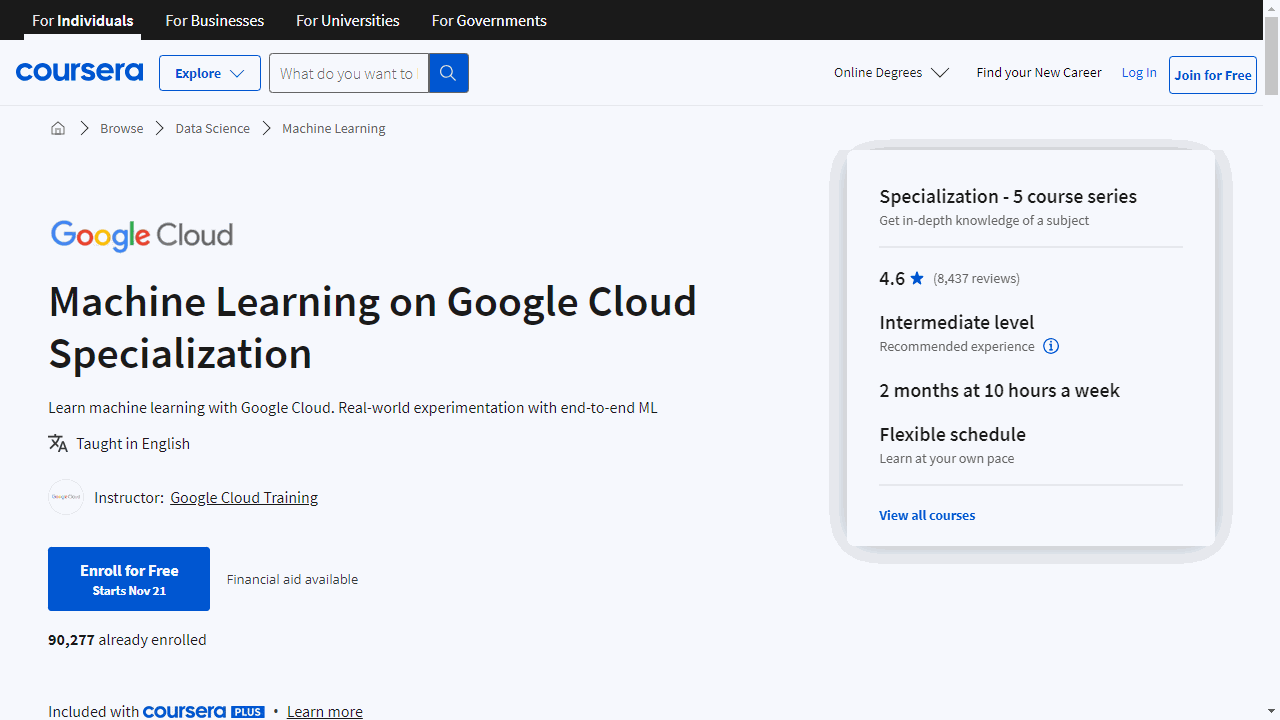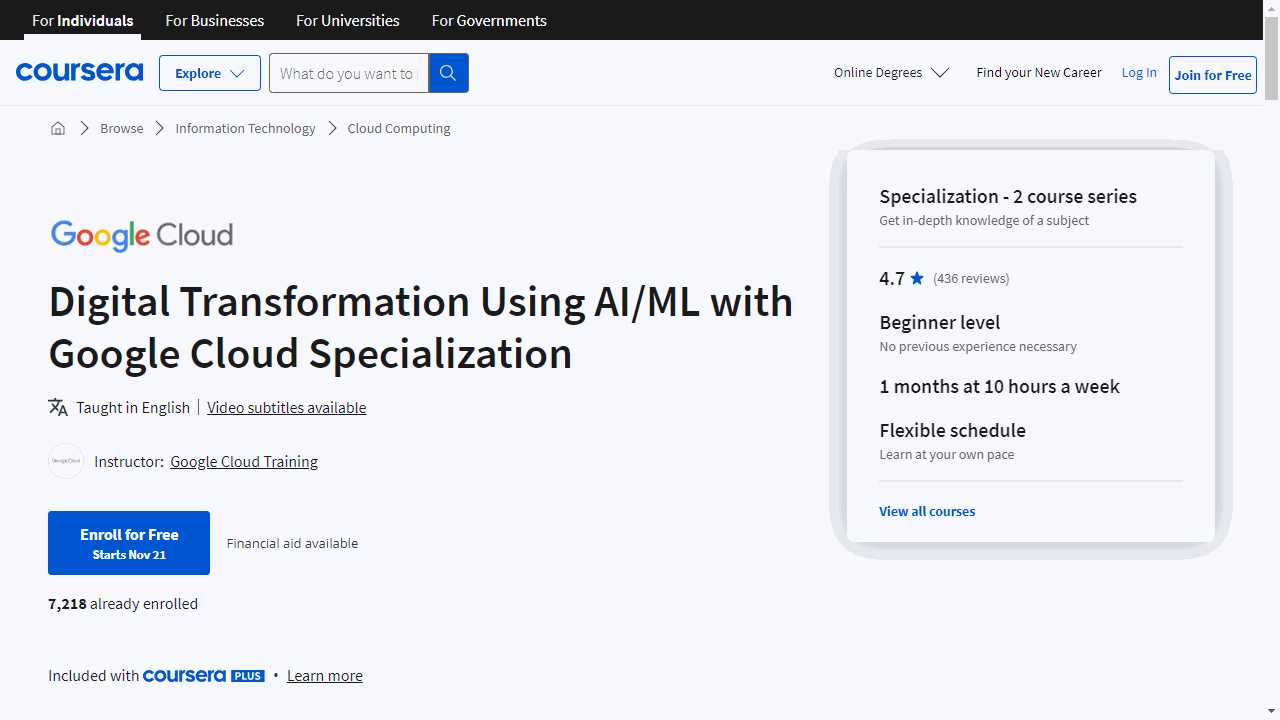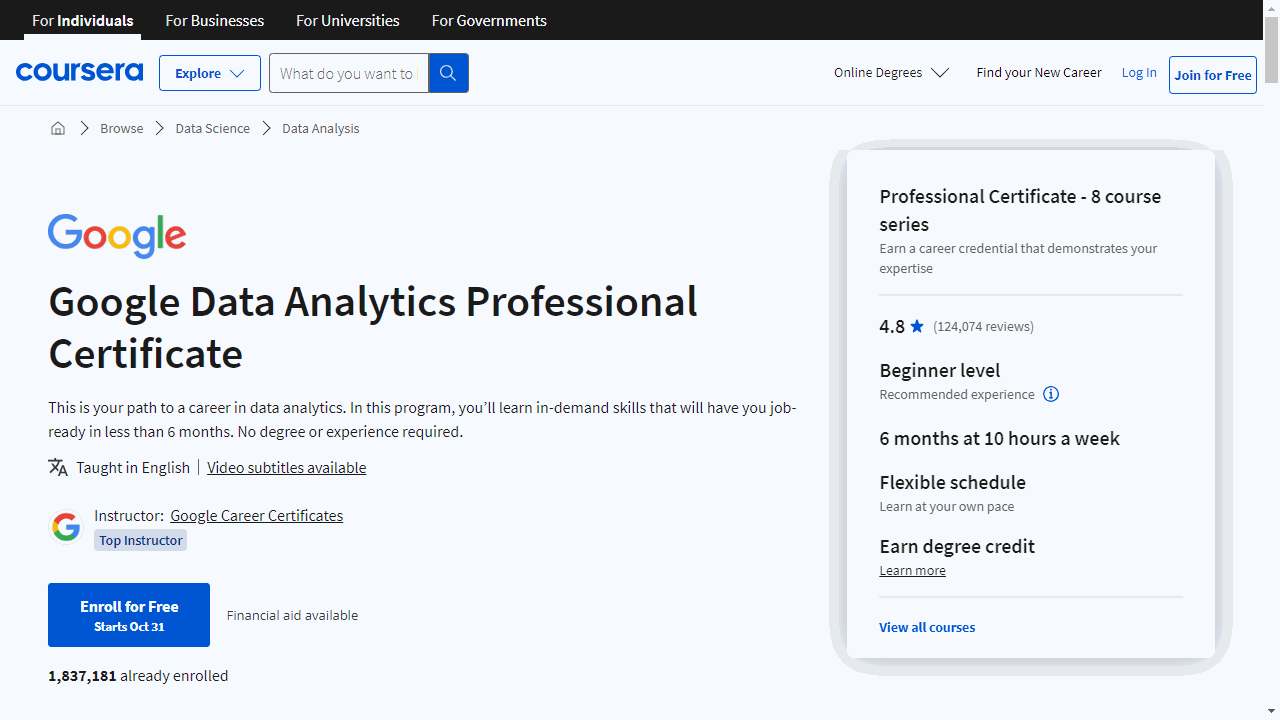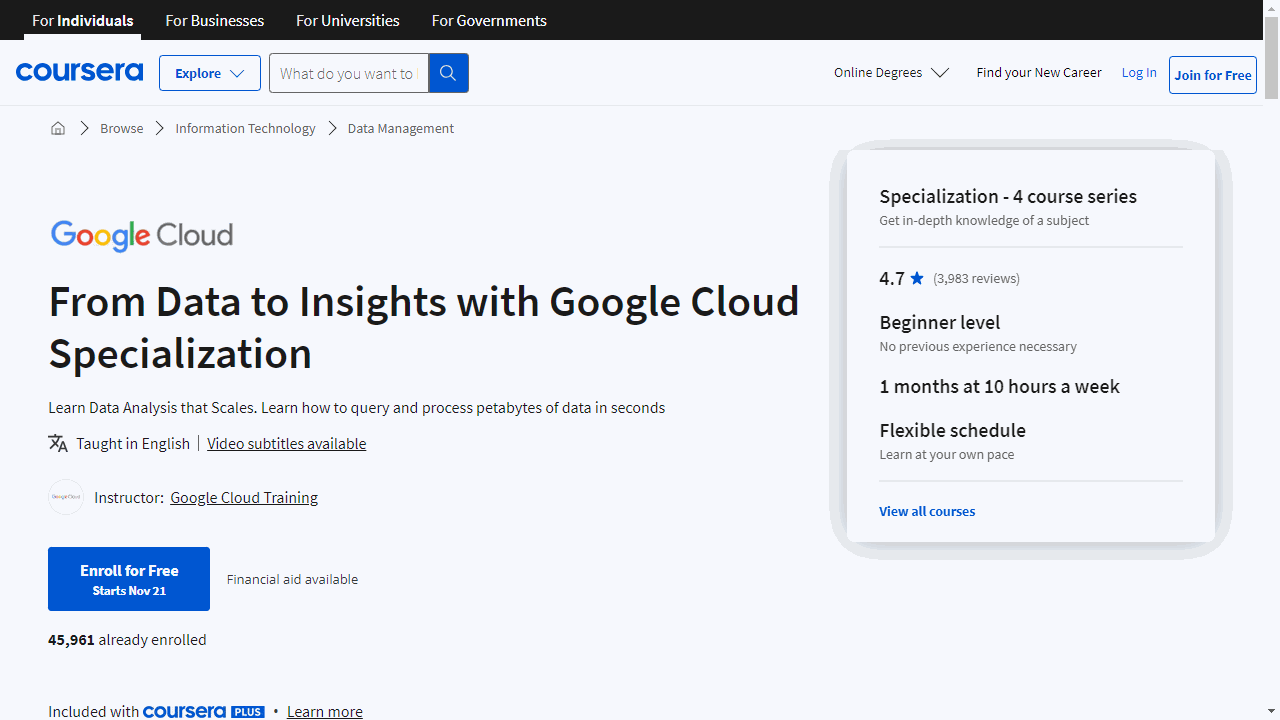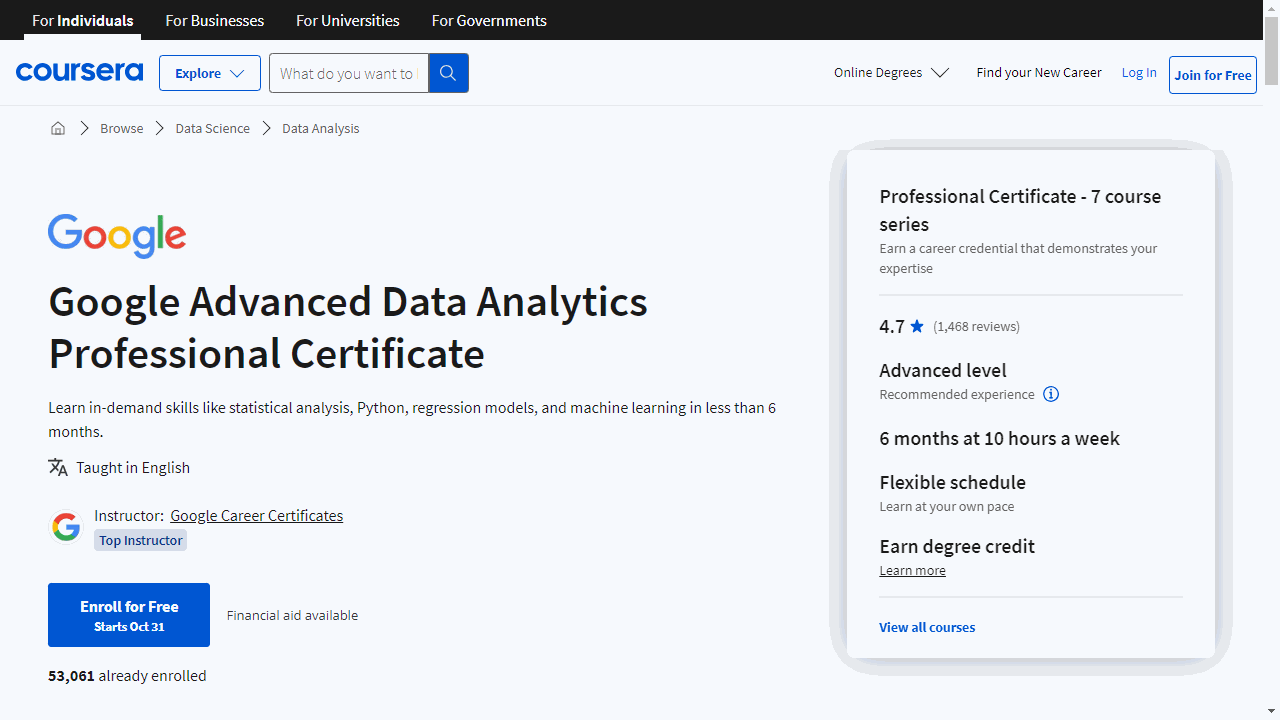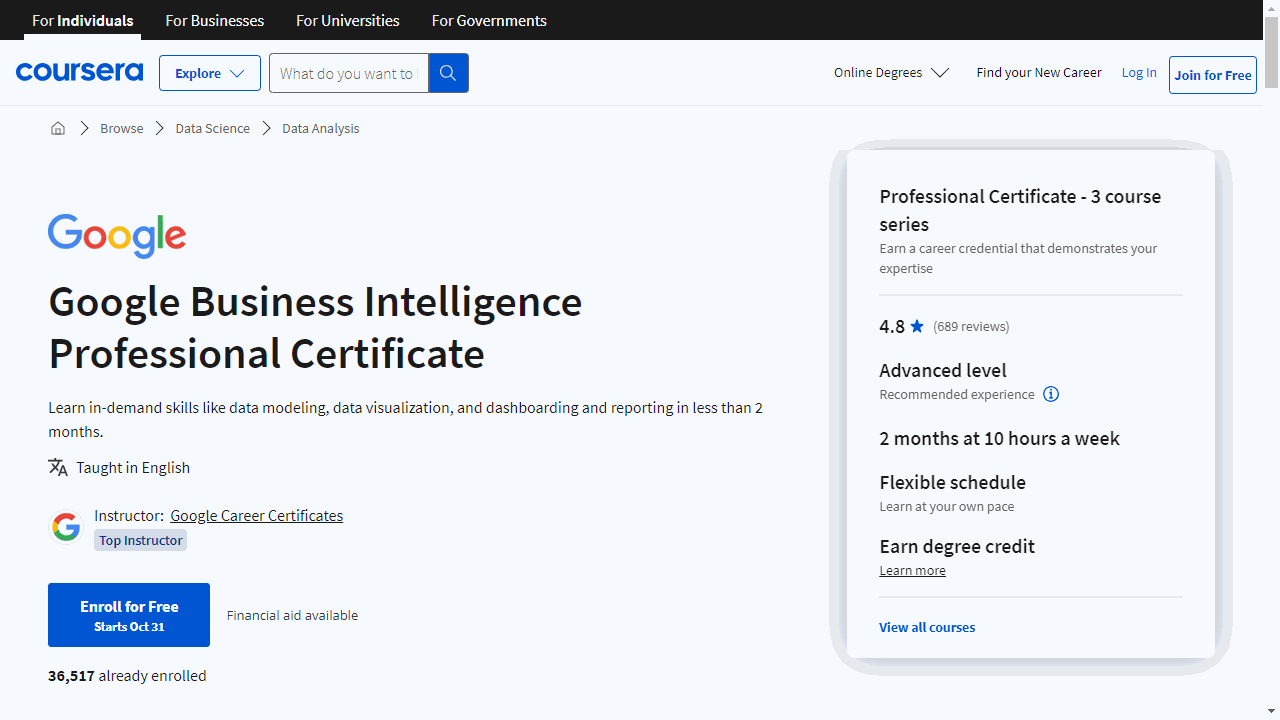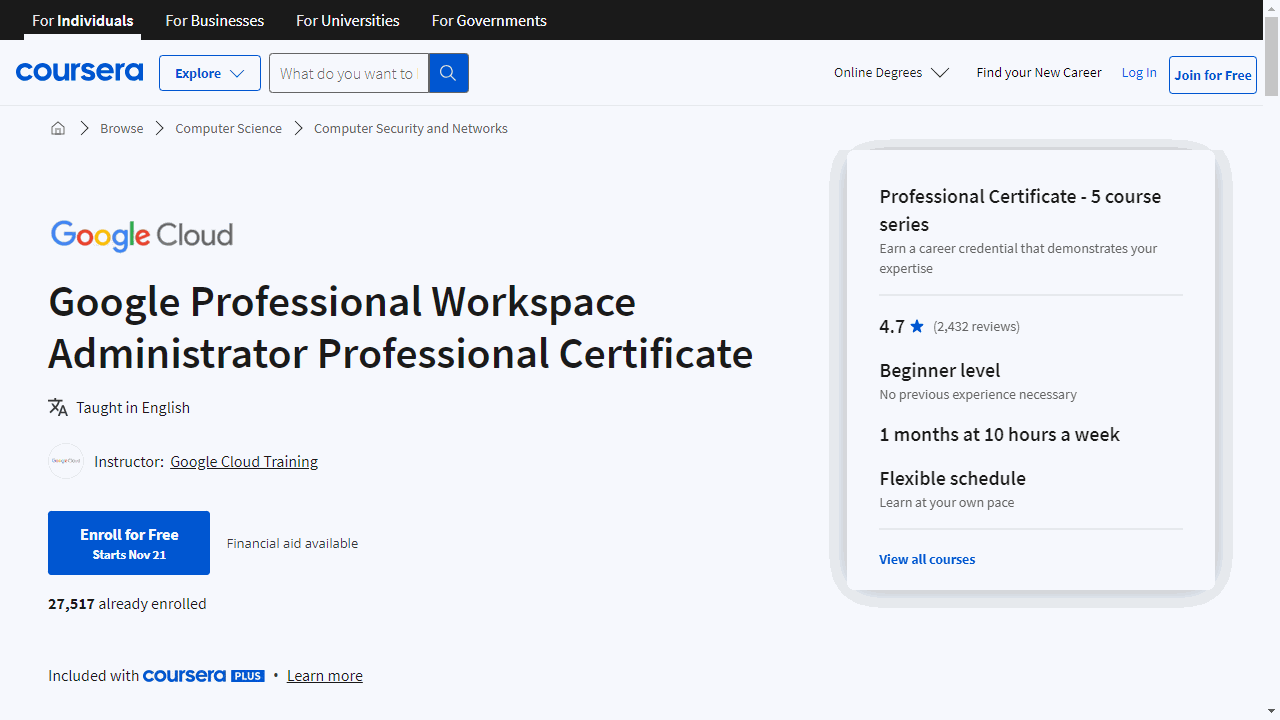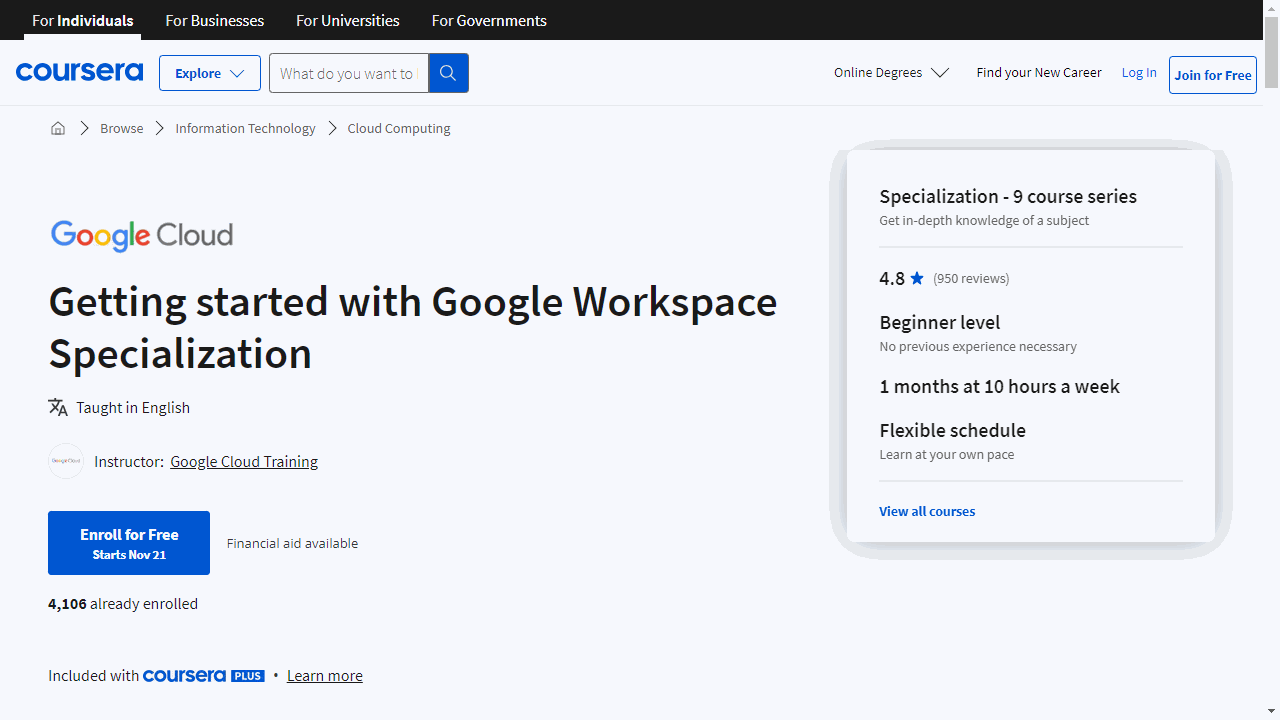Google certifications are highly sought-after in today’s tech landscape, providing individuals with the skills and knowledge needed to thrive in various fields like IT support, project management, UX design, and more.
Earning a Google certification demonstrates your expertise and commitment to staying ahead of the curve in a rapidly evolving industry.
It can open doors to new career opportunities, increase your earning potential, and boost your professional credibility.
However, finding the perfect Google certification course on Coursera can feel overwhelming.
With so many options available, it’s easy to get lost in the sea of courses and unsure which one best fits your goals and learning style.
You’re searching for a program that’s comprehensive, engaging, and taught by experts, but also aligns with your career aspirations.
For the best Google certification course overall on Coursera, we highly recommend the Google IT Support Professional Certificate.
This program covers a wide range of IT support topics, from technical fundamentals to network security and system administration.
It’s a hands-on, practical learning experience that equips you with the skills needed to succeed in an entry-level IT support role.
While the Google IT Support Professional Certificate is our top pick, there are other excellent Google certification courses available on Coursera.
To find the program that’s right for you, keep reading for our in-depth analysis of the best Google courses for various career paths, including project management, UX design, cloud computing, cybersecurity, data analytics, and more.
Best Google Course Overall On Coursera
Google IT Support Professional Certificate
Embarking on a journey to become an IT support specialist?
The “Google IT Support Professional Certificate” on Coursera is a comprehensive program that could be just what you’re looking for.
The journey begins with “Technical Support Fundamentals,” where you’ll get acquainted with the IT landscape.
This course isn’t just about theory; it’s hands-on, allowing you to understand the binary system, put together a computer, and install operating systems.
You’ll also gain insight into the Internet’s workings and the intricacies of computer software, all while honing your problem-solving and customer service skills.
Moving on to “The Bits and Bytes of Computer Networking,” this course demystifies the complex world of networks.
You’ll learn about the layered nature of computer networks, delve into TCP/IP protocols, and acquire network troubleshooting skills.
It also introduces you to the essentials of cloud computing, including storage and services, which are vital in today’s tech ecosystem.
With “Operating Systems and You: Becoming a Power User,” you’ll dive deeper into the operational side of computers.
Whether it’s through a graphical user interface or command line, you’ll learn to navigate, configure, and manage both Windows and Linux systems.
This course is about giving you the practical skills to manage software, users, and hardware effectively.
In “System Administration and IT Infrastructure Services,” the focus shifts to managing multiple systems within an organization.
You’ll explore how to select the right hardware, understand infrastructure services, and leverage cloud resources efficiently.
The course also covers directory services and disaster recovery, preparing you to maintain and protect an organization’s IT infrastructure.
Lastly, “IT Security: Defense against the digital dark arts” arms you with the knowledge to safeguard digital assets.
You’ll delve into encryption, understand the principles of authentication and authorization, and learn how to mitigate risks.
This course is crucial for anyone looking to ensure the security and integrity of a network.
Each course in the certificate program is designed to build on the previous one, ensuring a smooth learning curve.
You’ll gain not just theoretical knowledge but also practical skills through a blend of video lectures, demonstrations, and hands-on practice.
This program is a solid step towards a career in IT, providing you with the skills that are in demand in the workforce today.
Best Google Course For Project Management On Coursera
Google Project Management: Professional Certificate
Google’s Project Management Professional Certificate offers a complete education in modern project management.
Throughout the six courses, you’ll gain both hard and soft skills needed to lead projects and teams in any industry.
The program starts with “Foundations of Project Management”. Here you’ll get oriented with PM terminology, roles, and responsibilities. You’ll also preview potential career paths to motivate your learning.
Next is “Project Initiation”, where you’ll master starting projects right by defining goals, scope, stakeholders, and charters. Practical templates help you set expectations and assign responsibilities.
“Project Planning” dives into building plans and budgets. You’ll learn to estimate timelines, procure resources, assess risks, and draft communications plans. Industry tips and tools simplify complex planning.
In “Project Execution”, you’ll discover techniques to track work, manage changes, ensure quality, improve processes, analyze data, and lead teams through the realities of running a project.
“Agile Project Management” explores faster, flexible approaches like Scrum. You’ll learn key events, backlogs, roles, and coaching strategies to adapt PM frameworks.
Finally, an immersive Capstone enables you to apply your new expertise through real-world exercises. You’ll build a portfolio to showcase career readiness.
Throughout the certificate, Google PMs share insider perspectives. The skills are practical and actionable, rooted in data, tools, and workflows used every day by Google teams.
Upon completion, you’ll earn a certificate from a world-leading tech company.
Best Google Course For UX Design On Coursera
Google UX Design Professional Certificate
This program is tailored to equip you with the skills necessary for entry-level UX design positions, and it does so with a practical, hands-on approach that’s grounded in real-world application.
The initial course, “Foundations of User Experience (UX) Design,” lays the groundwork.
It’s not just about learning the terminology; it’s about understanding the significance of UX design in the broader context of user satisfaction and business success.
You’ll delve into user-centered design, accessibility, and equity-focused design—key concepts that form the backbone of a UX designer’s role.
As you progress to “Start the UX Design Process: Empathize, Define, and Ideate,” you’ll begin to see through the eyes of the user.
This course emphasizes empathy, a critical skill for any designer.
You’ll learn to identify user needs and brainstorm creative solutions, setting the stage for your portfolio project.
In “Build Wireframes and Low-Fidelity Prototypes,” the focus shifts to visualization.
Here, you’ll sketch out your ideas and use tools like Figma to create wireframes, translating abstract concepts into tangible designs.
This step is crucial as it bridges the gap between what users need and the final product they’ll interact with.
“Conduct UX Research and Test Early Concepts” teaches you to validate your designs through user feedback.
This course reinforces the idea that good design is not just about aesthetics but also about functionality and user satisfaction.
You’ll learn to conduct research studies, analyze data, and refine your designs based on real user input.
With “Create High-Fidelity Designs and Prototypes in Figma,” your designs gain polish and interactivity.
This course is where your prototypes start to mirror a finished product, allowing you to test and iterate with a high level of detail.
The sixth course, “Build Dynamic User Interfaces (UI) for Websites,” expands your skill set to the web.
You’ll apply design principles to create responsive websites, learning about information architecture and common web layouts.
This course also offers guidance on job preparation, from crafting a resume to building a professional portfolio website.
Finally, “Design a User Experience for Social Good & Prepare for Jobs” brings your learning full circle.
You’ll undertake a comprehensive project with a focus on social impact, demonstrating your ability to create meaningful and user-friendly designs.
Additionally, this course prepares you for the job market, offering interview advice and insights into the world of freelance design.
The courses are designed to simulate the UX design process, with Google’s own UX designers and researchers as your mentors.
And with no prior experience required, the program is accessible to anyone with a passion for design and a willingness to learn.
Best Google Courses For Cloud Computing On Coursera
Architecting with Google Compute Engine Specialization
This series of courses is meticulously crafted to elevate your understanding of Google Cloud from basic to advanced.
The journey begins with “Google Cloud Fundamentals: Core Infrastructure,” where you’ll familiarize yourself with the essential concepts and terminology.
It’s not just about theory; you’ll get your hands dirty with practical exercises on load balancing, VPNs, and autoscaling.
This course lays the groundwork for your Google Cloud expertise.
Moving on to “Essential Google Cloud Infrastructure: Foundation,” you’ll delve into the infrastructure services provided by Google Cloud, focusing on Compute Engine.
The course is interactive, allowing you to engage with the Google Cloud console and Cloud Shell, and teaches you to deploy solutions and manage virtual networks.
It’s a deep dive into the infrastructure that powers cloud applications.
The third course, “Essential Google Cloud Infrastructure: Core Services,” builds on your knowledge, introducing you to advanced topics like disaster recovery and site reliability engineering.
You’ll learn to administer access management, handle data storage services, and monitor your cloud resources effectively.
This course ensures you’re equipped to manage and optimize Google Cloud services.
For those interested in scalability and efficiency, “Elastic Google Cloud Infrastructure: Scaling and Automation” is invaluable.
You’ll explore how to connect infrastructures, configure load balancers, and implement autoscaling.
The focus here is on automation, teaching you to streamline the deployment of services and leverage Google Cloud’s managed services for optimal performance.
Lastly, “Reliable Google Cloud Infrastructure: Design and Process” rounds out the specialization by focusing on the design aspects of cloud architecture.
You’ll learn to balance technical requirements with business needs, ensuring your cloud deployments are reliable, secure, and cost-effective.
This course is about strategic thinking and applying best practices to your cloud solutions.
Each course in the specialization includes a mix of video lectures, demonstrations, and hands-on labs, providing a comprehensive learning experience.
You’ll gain actionable skills that are directly applicable to real-world cloud computing scenarios.
Architecting with Google Kubernetes Engine Specialization
This series of courses is designed to incrementally build your expertise, starting with the basics and advancing to complex operations within Google Cloud with a focus on Kubernetes Engine.
The journey begins with “Google Cloud Fundamentals: Core Infrastructure,” where you’ll familiarize yourself with the core concepts and terminology of Google Cloud.
This course isn’t just theoretical; it includes hands-on labs that allow you to apply what you’ve learned by setting up and managing a basic cloud infrastructure.
You’ll also explore various storage options, tailoring your knowledge to real-world applications.
Progressing to “Architecting with Google Kubernetes Engine: Foundations,” you’ll delve into the specifics of Google Cloud’s compute services and the architecture of Kubernetes.
This course is crucial for understanding the differences between computing platforms and for learning how to manage container images effectively.
As you advance to “Architecting with Google Kubernetes Engine: Workloads,” the focus shifts to practical Kubernetes operations.
You’ll gain experience in creating and managing deployments, using GKE networking tools, and implementing persistent storage solutions.
This course is particularly valuable for those looking to manage complex workloads with precision.
The specialization culminates with “Architecting with Google Kubernetes Engine: Production,” where you’ll tackle advanced topics such as GKE security, logging, monitoring, and integrating managed storage services.
This course equips you with the skills to implement and maintain robust, secure, and efficient cloud infrastructure.
This practical approach is essential for retaining knowledge and gaining confidence in your abilities.
Best Google Course For Data Engineering On Coursera
Google Cloud Database Engineer Specialization
This specialization offers a blend of theoretical knowledge and practical skills, essential for mastering Google Cloud’s database services.
Begin with “A Tour of Google Cloud Hands-on Labs,” where you’ll get a practical introduction to the Google Cloud Platform.
This course demystifies the cloud environment, teaching you how to manage projects and understand IAM roles and permissions through direct interaction with the Cloud Console.
Building on that foundation, “Google Cloud Fundamentals: Core Infrastructure” delves into the essential concepts and services of GCP, like Bigtable, Firestore, and Kubernetes Engine.
You’ll learn to construct a basic infrastructure and explore various storage options, setting the stage for more advanced topics.
“Cloud SQL for MySQL: Qwik Start” offers a concise, hands-on approach to creating and managing a Cloud SQL MySQL instance.
It’s a straightforward course that gets straight to the point, showing you how to perform SQL operations effectively.
If you’re considering a move from Amazon RDS to Cloud SQL, the course “Migrating to Cloud SQL from Amazon RDS for MySQL Using Database Migration Service” provides a clear roadmap.
It guides you through a one-time migration, ensuring a smooth transition for your MySQL data.
Similarly, “Migrating On-premises MySQL Using a Continuous Database Migration Service Job” is tailored for those looking to shift from an on-premises setup to Cloud SQL.
This course emphasizes the importance of continuous migration, allowing for real-time data syncing.
PostgreSQL enthusiasts will appreciate courses like “Migrate to Cloud SQL for PostgreSQL using Database Migration Service” and “Connect an App to a Cloud SQL for PostgreSQL Instance.”
These courses cover the essentials of migrating databases and integrating them with applications, a critical skill for any data engineer.
Security is paramount in data management, and “Securing a Cloud SQL for PostgreSQL Instance” addresses this head-on.
You’ll learn to implement robust security measures, ensuring your databases are protected against unauthorized access.
Data recovery is another critical area covered in “Configure Replication and Enable Point-in-Time-Recovery for Cloud SQL for PostgreSQL.”
This course teaches you how to set up replication and perform point-in-time recovery, providing peace of mind by safeguarding against data loss.
For a deep dive into Google’s horizontally scalable database, “Cloud Spanner - Loading Data and Performing Backups” and “Cloud Spanner - Defining Schemas and Understanding Query Plans” offer a comprehensive look at Cloud Spanner’s capabilities, from data insertion to query optimization.
The practical application of these skills is showcased in “Deploy a Modern Web App connected to a Cloud Spanner Instance,” where you’ll build and deploy a web application that interacts with Cloud Spanner, reinforcing the real-world relevance of the skills you’ve acquired.
Lastly, “Enterprise Database Migration” is the capstone of this specialization.
It’s designed for those tasked with large-scale database migrations, covering the intricacies of moving enterprise databases like SQL Server and Oracle to Google Cloud.
Best Google Course For IT Automation On Coursera
Google IT Automation with Python Professional Certificate
This hands-on certificate program teaches you Python, Git and GitHub, Linux, and IT automation from the ground up.
You’ll start by learning basic Python programming.
“The Crash Course on Python” teaches you Python syntax, data structures, and how to build simple programs. No prior experience needed!
Next, “Using Python to Interact with the Operating System” shows you how to manipulate files, processes, and automate tasks on any operating system.
“Introduction to Git and GitHub” teaches you to track code changes and collaborate with version control.
The certificate also covers crucial troubleshooting and debugging skills. You’ll learn strategies to tackle common pitfalls in code and IT infrastructure.
“Configuration Management and the Cloud” helps you automate fleet management and cloud computing.
Finally, you’ll tie everything together by building real-world automation solutions in Python.
The skills covered equip you to automate tasks, process data, build tools to solve problems, and more.
Best Google Course For Digital Marketing On Coursera
Google Digital Marketing & E-commerce Professional Certificate
This series of courses by Google is tailored for those eager to enter the digital marketing and e-commerce fields, with no prior experience required.
It starts with “Foundations of Digital Marketing and E-commerce,” where you’ll gain a solid understanding of the industry’s landscape.
You’ll learn about different roles, the importance of the marketing funnel, and how customer journeys shape marketing strategies.
Real-world examples from Google professionals make the learning experience tangible and immediately applicable.
As you progress to “Attract and Engage Customers with Digital Marketing,” the focus shifts to actionable skills like SEO and SEM.
This course builds your proficiency in techniques to increase your website’s traffic and engage potential customers effectively.
It’s about understanding the mechanics behind online visibility and how to leverage them to your advantage.
Social media’s role in business is undeniable, and “From Likes to Leads: Interact with Customers Online” helps you navigate this space with purpose.
You’ll learn to select the right platforms for your goals, craft engaging content, and use social media advertising to convert interactions into tangible outcomes.
Email marketing remains a cornerstone of digital communication, and “Think Outside the Inbox: Email Marketing” delves into creating impactful email campaigns.
From writing compelling content to managing subscriber lists and automating communications, this course covers the essentials of email marketing.
Data analysis is crucial for measuring success, and “Assess for Success: Marketing Analytics and Measurement” introduces you to tools like Google Analytics.
You’ll learn to interpret data, make informed decisions, and present your findings, turning numbers into narratives that resonate with stakeholders.
In “Make the Sale: Build, Launch, and Manage E-commerce Stores,” you’ll explore the nuts and bolts of online selling.
Setting up a mock store on Shopify and learning to engage customers through ads provides a practical framework for understanding e-commerce operations.
The capstone course, “Satisfaction Guaranteed: Develop Customer Loyalty Online,” teaches strategies to cultivate customer loyalty.
You’ll discover how to maintain client relationships and use performance data to refine your e-commerce strategy, ensuring long-term success.
Each course builds on the last, creating a comprehensive learning experience. Google experts provide guidance, sharing insights and tools used in the industry.
By the end of the program, you’ll have a portfolio to showcase your skills and the confidence to pursue entry-level job opportunities.
Best Google Courses For Cybersecurity On Coursera
Google Cybersecurity Professional Certificate
This certificate is designed to equip you with the foundational skills necessary for an entry-level cybersecurity position, and it does so with a clear, structured approach.
The journey begins with “Foundations of Cybersecurity,” where you’ll gain an understanding of the field’s history and its significance in modern business.
You’ll explore the roles and essential skills of a cybersecurity analyst, guided by Google’s own experts.
The course also introduces you to the CISSP security domains and the tools commonly used in the industry.
Building on that foundation, “Play It Safe: Manage Security Risks” delves into risk management, teaching you about security frameworks and controls.
You’ll learn to conduct a security audit and respond to threats, arming you with practical knowledge of the NIST framework.
As you progress to “Connect and Protect: Networks and Network Security,” the focus shifts to the intricacies of networking.
Understanding how data travels and the importance of securing networks against attacks is crucial, and this course covers that, including the use of firewalls and VPNs.
“Tools of the Trade: Linux and SQL” hones in on technical skills.
You’ll get comfortable with the Linux command line and SQL database management—skills that are indispensable for cybersecurity professionals.
In “Assets, Threats, and Vulnerabilities,” the curriculum encourages you to adopt an attacker’s mindset to better defend against threats.
You’ll learn about encryption, authentication, and threat modeling, which are key to identifying and mitigating risks.
The sixth course, “Sound the Alarm: Detection and Response,” is where you’ll tackle incident detection and response.
You’ll get hands-on with tools like IDS and SIEM, learning to analyze network traffic and respond to security incidents effectively.
“Automate Cybersecurity Tasks with Python” introduces you to Python programming, demonstrating how automation can enhance security measures.
You’ll write scripts to streamline tasks, a skill that boosts efficiency and effectiveness.
Finally, “Put It to Work: Prepare for Cybersecurity Jobs” focuses on the soft skills and practical steps needed to secure a job.
From crafting a resume to acing an interview, this course prepares you to present your newfound skills to potential employers.
Throughout the certificate, Google’s cybersecurity professionals provide insights and mentorship, ensuring that the knowledge you gain is both current and applicable.
The courses are designed to be interactive and engaging, with a balance of theory and hands-on practice.
This certificate stands out for its accessibility; no prior experience is needed to start.
It’s a comprehensive program that covers a broad range of topics without overwhelming you.
Security in Google Cloud Specialization
The specialization begins with “Google Cloud Fundamentals: Core Infrastructure.”
This course lays the groundwork, introducing you to the essentials of Google Cloud’s computing and storage services.
You’ll learn to identify the purpose and value of various Google Cloud products, understand the infrastructure organization, and get hands-on experience creating a basic cloud setup.
It’s an essential first step for anyone serious about working with Google Cloud.
Moving on to “Managing Security in Google Cloud,” you’ll delve into the security aspects of Google Cloud.
This course equips you with knowledge about Cloud Identity, Resource Manager, and Cloud IAM, among other tools.
You’ll learn to manage administrative identities and configure VPCs for enhanced security.
It’s a practical approach to understanding the security mechanisms within Google Cloud.
The “Security Best Practices in Google Cloud” course builds on your foundational knowledge.
Here, you’ll focus on securing Compute Engine, cloud data, and applications.
The course also provides insights into securing Kubernetes environments, a critical skill as containerization becomes more prevalent in cloud computing.
Finally, “Mitigating Security Vulnerabilities on Google Cloud” addresses the proactive side of security.
You’ll learn strategies to protect against DDoS and phishing attacks and understand how to manage content-related vulnerabilities.
The course also introduces tools like the Security Command Center and Forseti, which help you maintain compliance and monitor security within your organization’s cloud infrastructure.
The inclusion of hands-on labs ensures that you’re not just passively absorbing information but actively applying it, which can be crucial for retention and practical understanding.
Best Google Courses For Machine Learning On Coursera
Machine Learning on Google Cloud Specialization
This series of courses is designed to equip you with the skills and knowledge needed to navigate the machine learning landscape using Google’s powerful tools.
The specialization kicks off with “How Google does Machine Learning,” which lays the groundwork for understanding machine learning concepts and introduces you to Vertex AI.
This platform simplifies the process of building, training, and deploying machine learning models, all without the need for deep coding expertise.
You’ll also delve into best practices for machine learning on the cloud and learn how to approach AI responsibly.
Moving on to “Launching into Machine Learning,” the course emphasizes the importance of data quality and exploratory analysis.
It showcases how Vertex AI AutoML and BigQuery ML can be leveraged to create machine learning models effortlessly.
You’ll gain insights into model optimization and how to evaluate your models effectively, ensuring they perform well when deployed.
In “TensorFlow on Google Cloud,” you’ll dive deeper into model creation using TensorFlow and Keras.
This course is particularly valuable for those looking to understand the intricacies of data pipelines and model training at scale.
Vertex AI is again featured here, demonstrating how to bring models into production environments efficiently.
“Feature Engineering” is where you’ll refine your ability to identify and prepare the most impactful data features for your models.
The course covers the Vertex AI Feature Store and provides hands-on experience with BigQuery ML, Keras, and TensorFlow.
You’ll learn to preprocess and transform data, a critical step in enhancing model accuracy.
Lastly, “Machine Learning in the Enterprise” applies machine learning to business contexts.
It presents a case study approach to the ML workflow, addressing data management, governance, and preprocessing.
You’ll explore various modeling options, including AutoML, BigQuery ML, and custom training, and understand how to implement them based on specific business needs.
Throughout the specialization, you’ll acquire a robust set of skills, from managing large datasets to deploying scalable machine learning models.
For anyone looking to master machine learning on Google Cloud, this specialization offers a comprehensive and accessible pathway.
Digital Transformation Using AI/ML with Google Cloud Specialization
Let’s break down what these courses offer and why they might be the right fit for you.
Take “Infrastructure and Application Modernization with Google Cloud,” for instance.
It’s designed for those who find themselves at a crossroads with outdated IT systems.
This course provides a practical roadmap for leveraging cloud technology to revitalize your infrastructure.
You’ll gain insights into the pivotal role of cloud modernization in digital transformation and understand the various options for running compute workloads in the cloud.
The course demystifies concepts like containers, serverless computing, and APIs, showing you how they can be used to modernize applications effectively.
It also addresses strategic decisions, such as when to opt for hybrid or multi-cloud strategies, and introduces tools like GKE Enterprise to support these choices.
Moving on to “Managing Machine Learning Projects with Google Cloud,” this course is tailored for business professionals who may not have a technical background but are eager to oversee machine learning initiatives.
It strips away the technical jargon, focusing instead on how to translate business challenges into machine learning solutions.
You’ll learn to identify viable machine learning use cases, assess their potential impact, and understand the steps involved in bringing an ML project to fruition.
The course also covers essential considerations such as data quality and bias, equipping you with the knowledge to manage ML projects with an informed perspective.
These courses stand out for their practical approach, guiding you through the complexities of digital transformation with clarity and focus.
They’re not just about learning new concepts; they’re about applying them to drive real change in your organization.
By choosing these courses, you’re not just learning; you’re preparing to lead your business through the evolving landscape of digital technology with the confidence and support of Google Cloud’s robust infrastructure.
Best Google Courses For Data Analysis On Coursera
Google Data Analytics Professional Certificate
This program is a comprehensive suite of eight courses that cover everything from the foundations of data analytics to the application of R programming.
The first course, “Foundations: Data, Data, Everywhere,” is a great starting point. It introduces you to the world of data analytics and provides an overview of the key analytical skills and tools you’ll need, such as data cleaning, data analysis, and data visualization.
The course is taught by current Google data analysts, which gives you a real-world perspective on the subject matter.
The second course, “Ask Questions to Make Data-Driven Decisions,” builds on the first course and focuses on the importance of questioning and decision-making in data analysis, which is often overlooked in similar courses.
The third course, “Prepare Data for Exploration,” introduces you to new topics that will help you gain practical data analytics skills.
You’ll learn how to use tools like spreadsheets and SQL to extract and make use of the right data for your objectives.
The fourth course, “Process Data from Dirty to Clean,” teaches you how to check and clean your data using spreadsheets and SQL.
This course stands out because it focuses on the importance of data integrity and provides you with hands-on ways to accomplish common data analyst tasks.
The fifth course, “Analyze Data to Answer Questions,” explores the “analyze” phase of the data analysis process.
You’ll learn how to organize and format your data using spreadsheets and SQL to help you look at and think about your data in different ways.
The sixth course, “Share Data Through the Art of Visualization,” shows you how data visualizations can help bring your data to life.
You’ll also explore Tableau, a data viz platform that will help you create effective visualizations for your presentations.
The seventh course, “Data Analysis with R Programming,” introduces you to the programming language known as R.
I would prefer you take a course in Python, but R is still a great language to learn for data analysis.
It’s the second most popular programming language for data analysis, after Python, and this course will teach you how to use it for data analysis.
You’ll discover how R lets you clean, organize, analyze, visualize, and report data in new and more powerful ways.
The final course, “Google Data Analytics Capstone: Complete a Case Study,” gives you the opportunity to apply what you’ve learned in a real-world context.
You’ll choose an analytics-based scenario and complete a case study, which is a great way to showcase your skills to potential employers.
Overall, the Google Data Analytics Certificate is a comprehensive and practical program that equips you with the skills needed to apply for introductory-level data analyst jobs.
The courses are well-structured, engaging, and taught by industry professionals.
From Data to Insights with Google Cloud Specialization
This series of courses is designed to guide you through the complexities of data analysis and into the realm of machine learning, all within the Google Cloud ecosystem.
The journey begins with “Exploring and Preparing your Data with BigQuery.”
Here, you’ll confront the typical challenges data analysts encounter and learn how to navigate them using BigQuery and Dataprep.
The course equips you with practical SQL knowledge, enabling you to analyze and refine datasets effectively.
Moving on to “Creating New BigQuery Datasets and Visualizing Insights,” you’ll learn to import and visualize external datasets.
This course deepens your understanding of BigQuery, covering the creation of tables and the nuances of SQL operations like JOINs and UNIONs.
You’ll also get to grips with Looker Studio, which allows you to craft engaging, informative dashboards from your data.
In “Achieving Advanced Insights with BigQuery,” the focus shifts to more sophisticated SQL functions and query optimization.
You’ll gain insight into BigQuery’s internal architecture and learn how to manage complex data structures.
This course also addresses query performance and data security, providing you with the skills to handle data efficiently and responsibly.
The final course, “Applying Machine Learning to your Data with Google Cloud,” demystifies machine learning.
You’ll explore key concepts and terms, and see machine learning in action.
The course culminates with you using BigQuery ML to create your own machine learning models, empowering you to draw predictive insights from your data.
By the end of the specialization, you’ll have a robust foundation in data analysis, BigQuery, and machine learning.
Google Advanced Data Analytics Professional Certificate
This program is a comprehensive suite of seven courses that cover everything from the foundations of data science to advanced machine learning techniques.
It’s a great option to consider after completing the previous course, as it builds on the skills and knowledge you’ve gained in that program.
The first course, Foundations of Data Science, sets the stage for your learning journey.
It introduces you to the role of data professionals and the project workflow PACE (Plan, Analyze, Construct, Execute). This course is unique because it’s taught by Google employees who work in the field, providing you with real-world examples and hands-on activities.
Next, you’ll dive into Python programming in the Get Started with Python course.
Python is a powerful tool for data analysis, and this course will teach you the basics, from variables and data types to loops and data structures.
The third course, Go Beyond the Numbers: Translate Data into Insights, teaches you how to find the story within data and communicate it effectively. You’ll practice exploratory data analysis and learn how to create compelling data visualizations.
The Power of Statistics, the fourth course, introduces you to the use of statistics in data science.
You’ll explore key concepts like probability, sampling, confidence intervals, and hypothesis testing, all while using Python for statistical analysis.
In the fifth course, Regression Analysis: Simplify Complex Data Relationships, you’ll learn about different methods of data modeling, including linear regression, analysis of variance (ANOVA), and logistic regression.
This course will help you understand how data professionals use regression analysis to discover relationships between variables and identify key factors affecting business performance.
The sixth course, The Nuts and Bolts of Machine Learning, delves into the world of machine learning.
You’ll learn about supervised and unsupervised learning, and how to apply different machine learning models to business problems.
Finally, the Google Advanced Data Analytics Capstone course gives you the opportunity to apply everything you’ve learned in a capstone project.
This is a great way to showcase your new skills and knowledge.
Google Business Intelligence Professional Certificate
This program is a comprehensive, three-course journey that equips you with the skills needed to apply for entry-level roles as a business intelligence (BI) professional.
I decided to add this course because not only it’s a great way to enter the data field, but also because the “data science” job descriptions today often mean business intelligence and analytics jobs.
The first course, Foundations of Business Intelligence, introduces you to the role of BI professionals and the tools they use.
You’ll learn how to make key distinctions between business intelligence and data analysis, and how to use data in business processes and decision-making.
The course is led by Google employees who work in BI, providing real-world examples and hands-on activities.
With a high rating of 4.8 from over 600 raters, it’s clear that this course delivers on its promises.
Next up is The Path to Insights: Data Models and Pipelines.
This course dives deeper into the technical aspects of BI, focusing on data modeling and extract, transform, load (ETL) processes.
You’ll learn how to determine which data models are appropriate for different business requirements, and how to design an ETL process that meets organizational and stakeholder needs.
This course also boasts a high rating of 4.7, indicating that learners find it valuable and effective.
The final course, Decisions, Decisions: Dashboards and Reports, is the cherry on top.
It allows you to apply your understanding of stakeholder needs, plan and create BI visuals, and design reporting tools, including dashboards.
You’ll learn how to produce charts that represent BI data monitored over time, and how to design BI presentations to share insights with stakeholders.
This course has the highest rating of the three, at 4.8, showing that it’s a strong finish to the program.
One of the standout features of this program is that it’s taught by Google employees who currently work in BI.
This means you’re learning from professionals who are actively involved in the field, and can provide real-world examples and insights.
The hands-on activities that simulate job tasks are another unique feature, giving you practical experience that you can apply in your future career.
Best Google Workspace Courses On Coursera
Google Professional Workspace Administrator Professional Certificate
This series of courses is designed to equip you with the skills needed to effectively manage and secure a Google Workspace environment.
The journey begins with “Introduction to Google Workspace Administration,” where you’ll learn the fundamentals of setting up and navigating the admin console.
This course is practical, guiding you through the process of user and service management.
Just a heads-up: you’ll need to secure a domain and provide payment details for the trial account, but charges only apply post-trial if you choose to continue.
Moving on to “Managing Google Workspace,” this course delves into the specifics of Gmail, Calendar, and Drive & Docs.
You’ll learn how to configure these services and understand the capabilities of Google Vault.
The course also covers the interpretation of admin reports and the integration of multiple domains, providing a comprehensive view of service management.
With “Google Workspace Security,” the focus shifts to protecting your organization.
You’ll establish robust password policies, implement two-step verification, and manage third-party applications.
The course also introduces you to single sign-on (SSO) options and the use of the admin console to monitor security threats.
“Google Workspace Mail Management” is crucial for those looking to safeguard their organization’s email communication.
It covers defense against common threats like spam and phishing and introduces compliance and data loss prevention strategies.
You’ll also learn about mail routing and how to manage email settings for your organization.
Lastly, “Planning for a Google Workspace Deployment” rounds out the series by providing a strategic overview of deployment.
This course emphasizes the importance of a structured approach and the role of change management in ensuring a smooth transition to Google Workspace.
For anyone looking to specialize in Google Workspace or enhance their administrative capabilities, this professional certificate offers a clear pathway to developing those skills.
Getting Started With Google Workspace Specialization
Each course in this specialization is designed to enhance your digital proficiency, whether you’re a beginner or looking to refine your skills.
The “Gmail” course is more than just about sending emails; it’s about optimizing your email experience.
You’ll learn to organize your inbox efficiently, manage contacts, and even automate tasks with advanced search and filtering.
These skills are essential for anyone looking to maintain a clutter-free communication channel.
Moving on to “Google Calendar,” this course equips you with the tools to manage your time effectively.
You’ll discover how to schedule events, set reminders, and share your availability with colleagues, ensuring you never miss an important meeting or deadline.
With “Google Drive,” file management becomes straightforward.
The course guides you through organizing your digital workspace, sharing documents with teams, and even working offline.
It’s ideal for anyone aiming to keep their files accessible and in order.
“Google Docs” transforms the way you create and edit documents.
You’ll explore real-time collaboration, which allows multiple users to edit simultaneously, and delve into version control to track changes.
This course is perfect for teams working on shared documents.
In “Google Sheets,” you’ll tackle data manipulation and presentation.
From basic formulas to creating charts, this course helps you make sense of numbers and present them in a compelling way.
It’s a must for anyone who deals with data regularly.
“Google Slides” is all about impactful presentations.
You’ll learn to craft slides that capture attention, incorporate multimedia, and collaborate on presentations.
This course is beneficial for anyone who needs to convey ideas clearly and effectively.
For those who rely on virtual meetings, “Google Meet” offers a deep dive into hosting and managing video conferences.
You’ll learn to use features that enhance communication and engagement, making your virtual meetings as productive as possible.
“Google Chat” focuses on streamlining communication within teams.
The course covers messaging, creating spaces for group collaboration, and integrating with other Workspace tools.
It’s designed for those looking to improve team coordination.
Lastly, “Google Sheets - Advanced Topics” builds upon your foundational knowledge.
You’ll explore complex functions, data analysis, and integration with Google Forms.
This course is ideal for users ready to leverage Sheets for more advanced tasks.
Each course in this specialization is crafted to provide practical, applicable knowledge.
